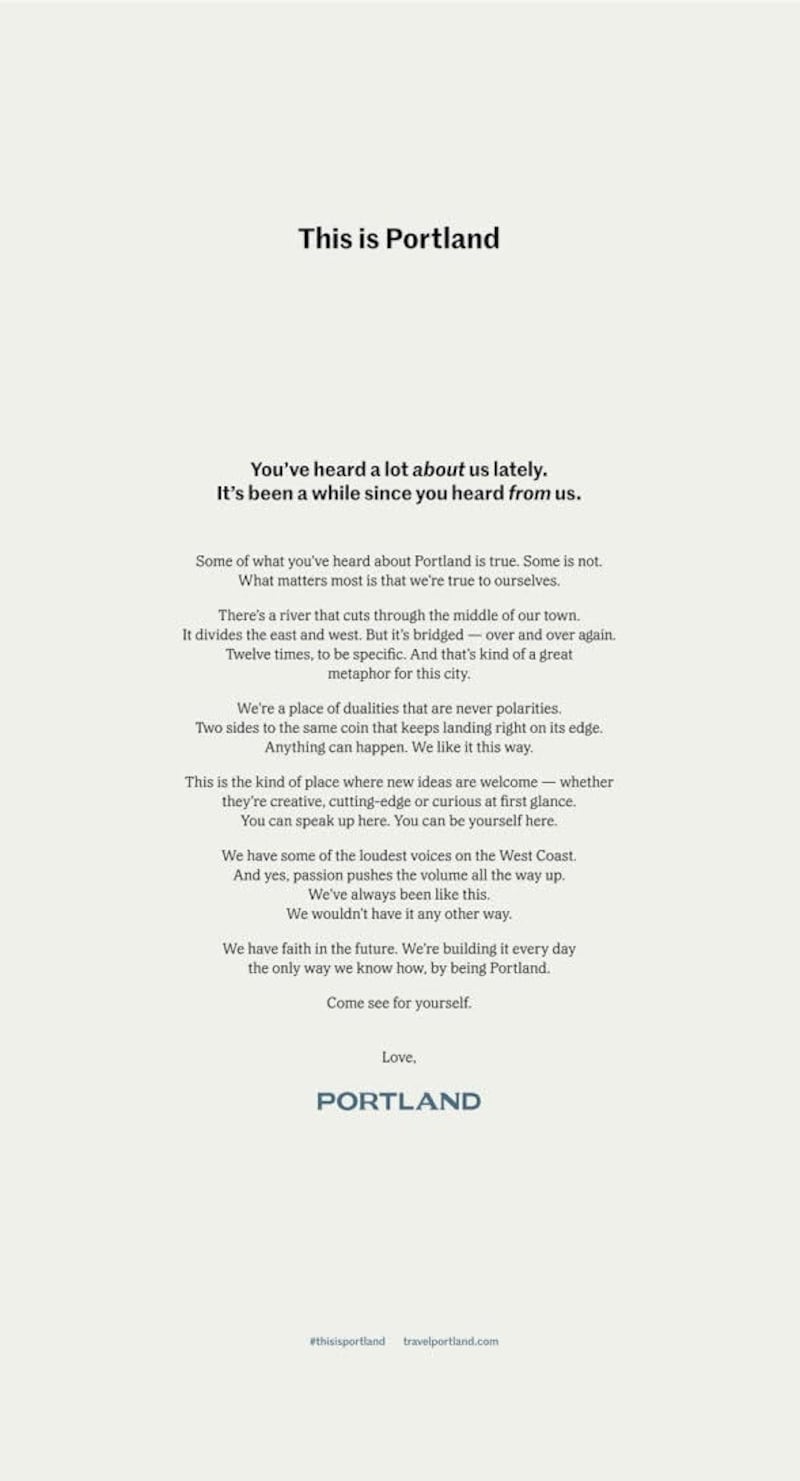A curious ad for the city of Portland appeared in The New York Times on June 20.
“You’ve heard a lot about us lately. It’s been a while since you heard from us. Some of what you’ve heard about Portland is true. Some is not. What matters most is that we’re true to ourselves,” the ad read on a sparse page of simple black text.
It continued: “We’re a place of dualities that are never polarities. Two sides to the same coin that keep landing right on its edge. Anything can happen. We like it this way.”

Travel Portland, the agency that placed the ad, explained in a June 21 statement that the ad is part of a wider campaign to right Portland’s reputation nationally and “to inspire overnight stays at Portland hotels and short-term rentals.”
One of the building blocks of the summer campaign is a video, which Travel Portland says “gives consumers the opportunity to see past the negative news headlines of last year into the lives of some everyday Portlanders right now.”
“It shows visitors will find a city that is evolving as it works toward the advancement of an even better and more equitable version of itself—a move toward a new normal instead of a return to the pre-pandemic past. The voiceover for the ‘This is Portland’ anthem celebrates and embraces the contrasts that Portland has in abundance: fine dining and food carts, luxury boutiques and used record stores, street art and forested trails,” Travel Portland said in its statement.
Travel Portland hired a minority-owned ad agency called INDUSTRY to produce the campaign.
Travel Portland tells WW that the campaign was paid for by the Tourism Improvement District, a program created in 2012 that places an additional 2 percent fee on overnight stays at hotels and vacation rentals on top of the existing 11.5 percent tax. The money garnered from that 2 percent additional fee is used by Travel Portland to promote the city as a vacation destination.
The ad in The New York Times, which Travel Portland says also appeared in the Los Angeles Times, San Francisco Chronicle and The Seattle Times, seems to be an effort to dispel Portland’s image in the national spotlight as the country’s chaotic and violent epicenter of racial justice protests, an image fueled in part by former President Donald Trump’s rhetoric.
The printed ad was addressed “Love, Portland.”
As things tend to do on the Twittersphere, the ad received a swift and merciless backlash on the platform—mostly from Portlanders taking issue with the ad assuming a unified voice for all of the city.
Dear @travelportland - I saw your ad in the @nytimes today. Your attempt to speak for Portland to the nation without calling out individual and institutional racism on the weekend of #JuneTeenth2021 was disappointing. Black and Brown people don’t all feel included. Do better. pic.twitter.com/GWedZJUZp6
— Martha Pellegrino (@marthapel) June 20, 2021
About that Travel Portland ad in the New York Times...https://t.co/ic6CreCdgT
— Jeff Eager (@Jeff_Eager) June 21, 2021
New newsletter from me today. I'd been chipping away at an essay for awhile on this... and then I saw that ad in the NYT this morning. https://t.co/aOZkwDW4wG
— Leah Sottile (@Leah_Sottile) June 20, 2021
My family came for a visit & was wondering why there is bumper to bumper traffic on every highway at 1130am on a Saturday and why PDX looks like LA did in the 90’s.
— Pepper J. Potts (@giantontheleft) June 22, 2021
PDX is not that cool & people shouldn’t touch it with a 10ft pole. If I could I’d get the hell out of this dump.
They forgot to mention the alt right like to vacation here as well.
— WatermarkPNW (@WatermarkPNW) June 20, 2021
Is this actionable, Travel Portland purporting to represent the entire city?
— Vincent Van Dinsky (@jimbaldwin123) June 20, 2021
After all, some other dualities that may come to mind when people think of Portland are competing opinions on whether police conduct during the George Floyd protests was appropriate, clashes where far-right protesters and antifascists use bear spray on each other, and bitter arguments about whether sweeps of homeless camps are cruel or necessary.
The mayor’s office did not respond to a request for comment about Travel Portland’s ad.

